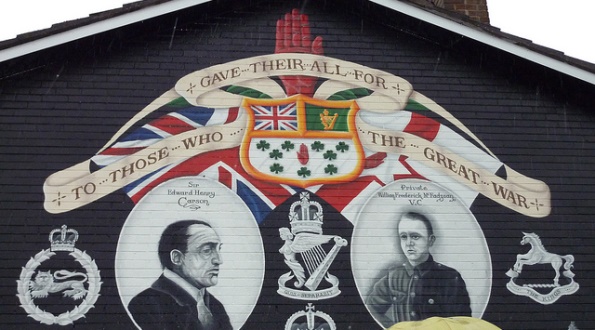BECOME A MEMBER
>JOIN
How Northern Ireland Plans to Mark the Centenary of the Start of WWI

Northern Ireland prepares for commemorating the centenary of the start of the first World War. Events are being planned in both Dublin and Belfast for the days around August 4th, the centenary of Britain’s declaration of war on Germany. PN member Jeffrey Donaldson, who was nominated as chairman of the Northern Ireland centenary commemorations committee, was quoted by The Irish Times: “You cannot airbrush that part of our history out of the narrative. Far from doing that, there is a willingness across the board to embrace it, to recognise it for what it was, with all of its complexities, and with a shared understanding of what occurred during that period.”
Since the opening of the Island of Ireland Peace Park, at Messines, in Belgium, in 1998, successive Irish governments have sought to right historical wrongs by remembering the Irish soldiers who died in the first World War.
At the launch of the Military Service Pension Collections last week, Taoiseach Enda Kenny spoke of the thousands of Irish men who lost their “lives or limbs or their sanity, sometimes even hope itself, their experiences denigrated, even denied, when they came home – but no more”.
The principal Irish commemoration for the start of the war will be the unveiling of the Cross of Sacrifice, at Glasnevin Cemetery, on July 31st. The seven-metre-high cross, embedded with a bronze sword, will remember the 208 Irish soldiers who died after coming home from the front and were buried in unmarked graves.
The cross, which is being funded by the Glasnevin Trust and the Commonwealth War Graves Commission, will stand beside the cemetery’s memorial walls for the World Wars.
Events are being planned in both Dublin and Belfast for the days around August 4th, the centenary of Britain’s declaration of war on Germany. Next year the Government will issue a stamp to mark the centenary of the Battle of Gallipoli. The centenary of the Battle of the Somme, in 2016, will also see extensive commemorations.
Both the Government and the Northern Ireland Assembly are taking an island-wide approach. After being nominated as chairman of the Northern Ireland centenary commemorations committee, Jeffrey Donaldson described himself as “a proud Ulsterman and a proud unionist” who “will say this: the time has come to build those bridges”.
He does not want the remembrance of the first World War to be sectarian, he says. “I welcome the fact that in every county right across the island, the remembrance of these soldiers is being embraced . . .
“You cannot airbrush that part of our history out of the narrative. Far from doing that, there is a willingness across the board to embrace it, to recognise it for what it was, with all of its complexities, and with a shared understanding of what occurred during that period.
“If we can ease the tension around what happened in the past, then I think there is a better chance that we can have a future where the tension is reduced and where there is a growing mutual respect and understanding rather than suspicion and mistrust.”
Originally published by The Irish Times.
Photo by DUP Photos.

